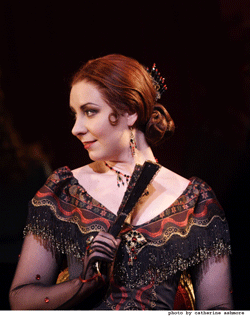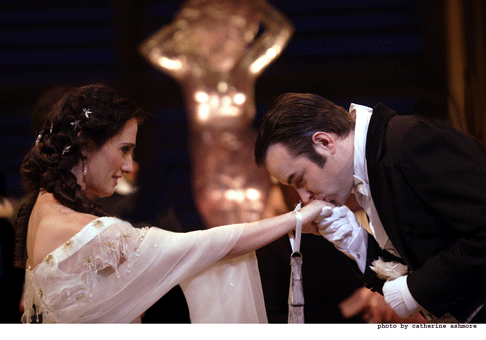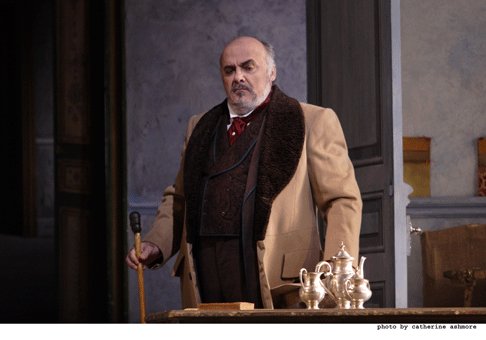05 Jan 2012
La Traviata: The 454th Performance at the Royal Opera House
This performance of La Traviata was the 454th at the Royal Opera House, and the first performance in the 3rd revival this season of Richard Eyre’s production.

This performance of La Traviata was the 454th at the Royal Opera House, and the first performance in the 3rd revival this season of Richard Eyre’s production.
Each of this season’s revivals has been in the hands of a different revival director. This time, Paul Higgins oversaw Ermonela Jaho returning as Violetta and Stephen Costello making his Covent Garden role debut as Alfredo.
Since her last appearance here as Violetta, Jaho has made quite a stir with her performance as Suor Angelica in the new production of Puccini’s Il Trittico. Costello has previously appeared at the Royal Opera House in a concert performance of Donizetti’s Linda di Chamounix and as Rinuccio in Il Trittico, so that Alfredo represents the singers biggest stage role yet at Covent Garden.
Bob Crowley’s designs still look very well and the production remains very handsome. It was new in 1994 and this run seems to be its 15th revival, so that one of the items of interest would be how the production was holding up. One always expects the party scene in Act 1 to be something of a mess and Crowley’s design seems to intentionally crowd the partygoers, but I did wonder whether the chaos could be more organised, whether there had been quite enough rehearsal time.
 Justina Gringyte as Flora
Justina Gringyte as Flora
Jaho is a slim, almost diminutive figure who has no problem at all looking fragile, which is always a help in this role. She was very studied dramatically, using a range of expressive but carefully choreographed movements. Not at all stiff or static, but rather as if Violetta had constructed a persona for herself; an interestingly valid point of view, though this may simply be Jaho’s natural style.
Technically Jaho is a lyric soprano with a tight vibrato and an attractively veiled quality to the voice. In Act 1 her coloratura was creditable rather than pin-sharp, and she had an occasional tendency to attack notes from below. But she also had the magical ability to thin her voice right down.
“Sempre libera” had a slightly desperate quality to it and you could almost feel Jaho saying thank goodness that was over at the end of the act. But then few sopranos manage all 3 acts of La Traviata with equal facility, that’s one of the role’s challenges.
Costello was nicely correct and callow as Alfredo, especially on his first entry into the party. Slim and good looking, his voice was a surprise being thicker and darker than expected, with a nicely focused Italianate tone. He brought a lovely lyric feel to the Brindisi. With both him and Jaho you felt that there was a good likelihood that their voices will move on to more dramatic roles.
 Ermonela Jaho as Violetta and Stephen Costello as Alfredo
Ermonela Jaho as Violetta and Stephen Costello as Alfredo
Interaction between them was rather nervous and this seemed to reflect in their voices. You did not really believe that there was passion there. The intensity in Costello’s voice didn’t quite match his body language. Jaho seemed to find form in Act 2, expressing Violetta’s suffering with great expressiveness.
Jaho thinned her voice magically for “Dite alla giovine” and the duet with Gavanelli crackled with emotion in a way that hadn’t happened in Act 1. In Act 3, “Addio del passato” was beautifully sung and profoundly moving, but here and elsewhere in this act, Jaho did rather too much operatic staggering about; I happen to think that less is more here. Her death was dramatic and beautiful, but perhaps a little too ‘stagey’. Jaho’s performance was profoundly moving, but ultimately I found her to be a little too studied.
Costello was similarly impressive. I often feel that Alfredo is not the brightest button in the box and whether by accident or design Costello conveyed something of this. In the scene at Flora’s the duet between Jaho and Costello was thrilling, his anger blazed forth in a way that his passion did not. Unfortunately Costello reverted to looking stiff, though he sang with conviction and passion. He did spend a lot of times on his knees, which he seemed to find uncomfortable. Musically Costello turned in a passionate and stylish performance, but this was not always reflected in his body language. It seemed he would have benefited from greater rehearsal time with a strong director.
 Paolo Gavanelli as Girogio Germont
Paolo Gavanelli as Girogio Germont
It helped that Paolo Gavanelli’s Giorgio Germont was pure class. Every inch an aristocrat, severely controlled, not a blusterer, Gavanelli sang beautifully with profoundly expressive line. He conveyed the character’s breeding and inhibition, and it was lovely to hear it sung by a native Italian.
It was nice to see David Stout as the Baron and he turned in a stylish performance. The other smaller roles were well cast, with Justina Gingyte as Flora, Jeremy White as the Marquis and Ji Hyun Kim as Gastone. Robert Lloyd made a sympathetic Doctor and Hanna Hipp a strong Annina.
Maurizio Benini provided a safe pair of hands in the pit, with support for the singers and well placed flexible tempi. This wasn’t perhaps a vintage revival but it was certainly involving, with some strongly characterised performances.
Robert Hugill